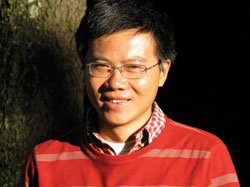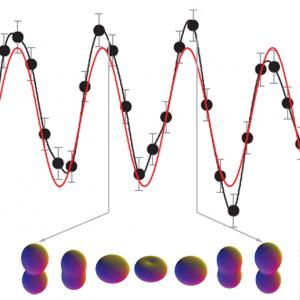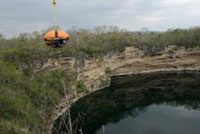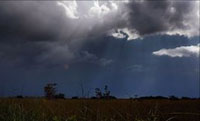Climate Change Affects Geographical Range of Plants, Study Finds (16/08/2010)
 Researches at the University of Gothenburg have shown how climate change many million years ago has influenced the geographical range of plants by modelling climate preferences for extinct species. The method can also be used to predict what effects climate change of today and tomorrow will have on future distributions of plants and animals.
Researches at the University of Gothenburg have shown how climate change many million years ago has influenced the geographical range of plants by modelling climate preferences for extinct species. The method can also be used to predict what effects climate change of today and tomorrow will have on future distributions of plants and animals.
Vietnamese gov’t after honored mathematician (12/08/2010)
 The Vietnamese government is making efforts to invite Ngo Bao Chau, whose mathematics research has earned international acclaim and awards, to work in the country.
The Vietnamese government is making efforts to invite Ngo Bao Chau, whose mathematics research has earned international acclaim and awards, to work in the country.
During a visit to Chau's family Sunday, Deputy Prime Minister, Nguyen Thien Nhan, said the government is willing to offer the best working and living conditions to Chau, whose groundbreaking mathematical proof was honored by TIME Magazine as one of the top ten scientific discoveries of 2009.
How Big Do Stars Grow? (06/08/2010)
 A huge star, 265 times the mass of our sun, was recently discovered. Is that as big as it gets?
A huge star, 265 times the mass of our sun, was recently discovered. Is that as big as it gets?
To most people, stars are those twinkling little lights that shine way up in the night sky. If you have ever spent a night under a truly dark sky you may be stunned to see how many there really are.
It’s estimated that there are more stars in the Universe than there are grains of sand on the Earth. Stars are plentiful in the Cosmos, but what of their sizes?
For the First Time Ever, Scientists Watch an Atom's Electrons Moving in Real Time (05/08/2010)
 An international team of scientists led by groups from the Max Planck Institute of Quantum Optics (MPQ) in Garching, Germany, and from the U.S. Department of Energy's Lawrence Berkeley National Laboratory and the University of California at Berkeley has used ultrashort flashes of laser light to directly observe the movement of an atom's outer electrons for the first time.
An international team of scientists led by groups from the Max Planck Institute of Quantum Optics (MPQ) in Garching, Germany, and from the U.S. Department of Energy's Lawrence Berkeley National Laboratory and the University of California at Berkeley has used ultrashort flashes of laser light to directly observe the movement of an atom's outer electrons for the first time.
Receipts a large — and largely ignored — source of BPA (05/08/2010)
 Small studies raise big alarm about exposure to a hormone-mimicking chemical
Small studies raise big alarm about exposure to a hormone-mimicking chemical
Cash register and other receipts may expose consumers to substantial amounts of bisphenol A, a hormone-mimicking chemical that has been linked with a host of potential health risks, according to a trio of recent studies. Each study offers preliminary evidence that a large number of retail outlets print sales receipts on certain types of heat-sensitive, or thermal, paper that use BPA as a color developer.
Two of the new studies also showed that the BPA coating easily rubs off onto fingers. And one found evidence that BPA from receipts may penetrate skin.
Diving Robot Discovers Life in the Slow Lane (05/08/2010)
 The DEPTHX autonomous robot as it is being lowered into the Zacatón sinkhole in northeastern
The DEPTHX autonomous robot as it is being lowered into the Zacatón sinkhole in northeastern
Scientists have found amazingly diverse microbial life in the world's deepest water-filled sinkhole, even down where sunlight can't reach.
Cassini Scientist for a Day Contest (04/08/2010)
T he Cassini Scientist for a Day contest challenges students to become NASA scientists studying Saturn. Participants examine three possible observations taken by Cassini and choose the one they think will yield the best scientific results. This choice must then be supported in a 500-word essay. Teaming up is encouraged. Winners will participate in a teleconference with Cassini scientists.
he Cassini Scientist for a Day contest challenges students to become NASA scientists studying Saturn. Participants examine three possible observations taken by Cassini and choose the one they think will yield the best scientific results. This choice must then be supported in a 500-word essay. Teaming up is encouraged. Winners will participate in a teleconference with Cassini scientists.
Everglades and Madagascar forests on Unesco danger list (01/08/2010)
 A UN panel has added
A UN panel has added
Unesco's World Heritage Committee said development in the
The pollution level there was so high it was killing marine life, it added.
Call to check on mobile network security (01/08/2010)
 Mobile phone users are being encouraged to find out if operators are doing enough to keep their calls secret.
Mobile phone users are being encouraged to find out if operators are doing enough to keep their calls secret.
Security researchers have released tools that, they say, make it easy to see what security systems operators use to stop eavesdropping.
The researchers want to expose those operators that have not updated security systems to prevent others listening in.
The tools are based on an attack first demonstrated in late 2009.
Researchers Find New Translocation; Weak Spots in DNA Lead to Genetic Disease (31/07/2010)
A genetics research team based at The Children's Hospital of Philadelphia continues to discover recurrent translocations -- places in which two chromosomes exchange pieces of themselves. As many as 1 in 600 persons carry balanced chromosome translocations, which involve no loss or gain of DNA. Most such people appear healthy, but may have a child with abnormal chromosome composition and disabilities resulting from disrupted, extra or missing copies of genes.









